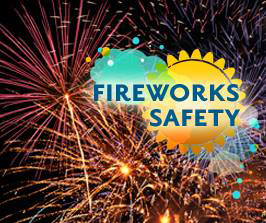It's a New Day in Public Health.
The Florida Department of Health works to protect, promote, and improve the health of all people in Florida through integrated state, county, and community efforts.
National Fireworks Safety Month
July 01, 2014

Fireworks and Celebrations—Know the Dangers
Fireworks and celebrations just seem to go together. Long associated with Independence Day, the use of fireworks on other holidays, such as Memorial Day, Labor Day and New Year’s Eve, is on the rise. Unfortunately, a happy celebration can quickly turn painful if consumer fireworks are misused.
Thousands of firework-related injuries are treated in hospital emergency rooms across the country each year. In 2013, approximately 40 percent of all fireworks-related emergency department-treated injuries were children age 15 years and younger, and more than half were individuals age 20 or younger. If used improperly, fireworks can result in injury to the eyes, as well as varying degrees of burns on the skin.
July is National Fireworks Safety Month. There are year-round precautions individuals and parents can take to prevent potential injuries.
Be prepared:
- Know and follow all county and city fireworks laws for your area.
- Never use homemade and/or illegal fireworks.
- Clear away any dry vegetation and debris from the area before igniting any fireworks.
- Always have a water source, full bucket of water and/or fire-extinguisher, close at hand.
- Make sure your pets are indoors before you begin, to reduce the risk they will run loose or get injured. Animals have sensitive ears and can be frightened or stressed during a fireworks celebration.
While celebrating:
- Be sure those watching are at a safe distance from where fireworks are being ignited.
- Use safety eyewear, glasses or goggles, to protect your eyes while igniting fireworks.
- Never carry fireworks in your pocket or shoot them off in metal or glass containers.
- Do not allow children to play with or light fireworks.
- Sparklers should only be used under close adult supervision. While often considered a “safe” firework for the young, the tip of a sparkler burns at 1,200 degrees or higher, which can cause third degree burns.
- If a firework does not light or fire, let it sit for at least 20 minutes then carefully place it in a bucket of water.
Clean up:
- Make sure fireworks are cold before handling and place all used fireworks into a bucket of water.
- Clean up all debris.
- Be sure matches, lighters and any unused fireworks are out of the sight and reach of children before, during and after your celebration.
Check with your local fire and police departments for guidance on permitted fireworks. Better yet, to avoid these risks, leave the celebratory fireworks to trained professionals.
On average, the number of reported fires in the U.S. is substantially higher on the July 4th holiday. It’s estimated that consumer fireworks account for almost half of these reported fires, more than any other potential cause. Protect your family, home and property from potential danger by being informed on the hazards posed by using consumer fireworks.
Take these simple steps before, during and after using consumer fireworks to help keep you, your family and pets healthy, and your celebration safe.




Connect with DOH